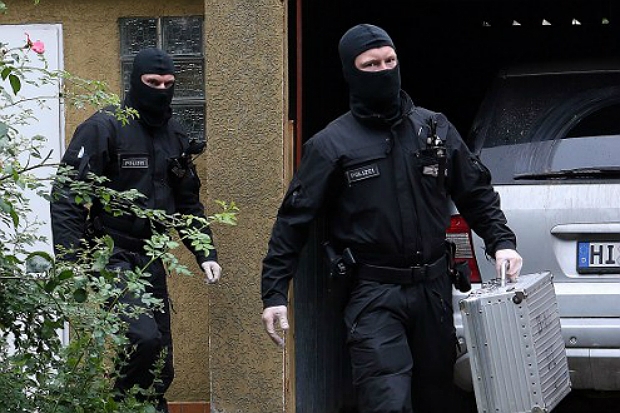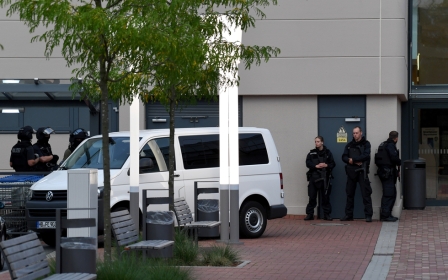German raids target preachers suspected of recruiting Syrian fighters

Police in Germany carried out raids in several towns in the western state of North Rhine-Westphalia targeting Islamic preachers suspected of trying to recruit young men to fight in Syria and Iraq on Wednesday, the state's criminal police said.
The raids took place in the towns of Duisburg and Dortmund among others, the Westdeutsche Allgemeine Zeitung (WAZ) newspaper reported.
Germany is on high alert after a spate of attacks since July that have left 15 people dead, including four attackers, and dozens injured. Two of the attackers, a Syrian asylum seeker and a refugee from either Pakistan or Afghanistan, had links to Islamic militancy, officials say.
Germany's Interior Minister Thomas de Maiziere will propose a raft of new security measures on Thursday, including speedier deportations and waiving doctor-patient confidentiality in some cases, German media reported.
The measures are expected to be introduced in the current legislative period, meaning they would come into force by late 2017.
The new measures include speeding up deportations of foreign potential attackers and criminals and the introduction of a new reason for deportation: "danger to public safety", the Bild newspaper reported, citing security sources.
The Koelner Stadt-Anzeiger said the new legislation would also facilitate data retention and limit how long people whose asylum applications had been rejected could stay in the country.
In addition, the proposed law could allow doctors in certain instances to break confidentiality and inform the authorities if their patients confided in them about any planned crimes, Bild reported.
The measures build on a nine-point plan to improve security announced by Chancellor Angela Merkel in the wake of the attacks, the paper said.
Separately, state interior ministers belonging to Merkel's Christian Democrats (CDU) and her Bavarian allies the Christian Social Union (CSU), also want to strengthen Germany's security laws and have come up with a series of demands, according to the Redaktionsnetzwerk Deutschland (RND).
'National prevention strategy'
Last week a German counter-terrorist policy adviser called for the country to adopt a "national prevention strategy" to deal with the rise of attacks in the country, warning that recent attacks could be a precursor to a much larger strike.
Daniel Heinke, policy planning and special affairs director for the interior ministry of the city-state of Bremen, warned the audience at the "ISIS in Europe" conference at King's College London that the recent spate of attacks in Germany could potentially be aiming to "irritate" law enforcement in the country in order to distract them from an upcoming threat.
“What we should do is try to develop an idea how to respond to these threats, how to have an overall approach," Heinke said.
The German government estimates that there are 820 citizens who have travelled to Syria "out of an Islamist motivation", he said, meaning that not all have necessarily gone to fight in the war, but also to serve a variety of purposes and work with a variety of groups.
But the country's current system is organised locally with different districts using different strategies and services to deal those returnees and social tension, said Heinke
“In some cities, in some areas, they are addressed directly by social services and they try to reach out to them to reintegrate them into society," said Heinke. "In other areas, not so. And we have no clear idea what to do.”
"It doesn’t work to have a strategy in district and then another strategy 20km away," he added.
Last week, Chancellor Merkel warned that Germany was locked in “a struggle, or a war, if you like” with IS and called for an "early warning system" to detect signs of radicalisation among refugees.
"I didn’t say this was a going to be simple - that we could just do it," she said. "But I am still convinced that we can do it. This is a historic test in a time of globalisation.”
New MEE newsletter: Jerusalem Dispatch
Sign up to get the latest insights and analysis on Israel-Palestine, alongside Turkey Unpacked and other MEE newsletters
Middle East Eye delivers independent and unrivalled coverage and analysis of the Middle East, North Africa and beyond. To learn more about republishing this content and the associated fees, please fill out this form. More about MEE can be found here.




